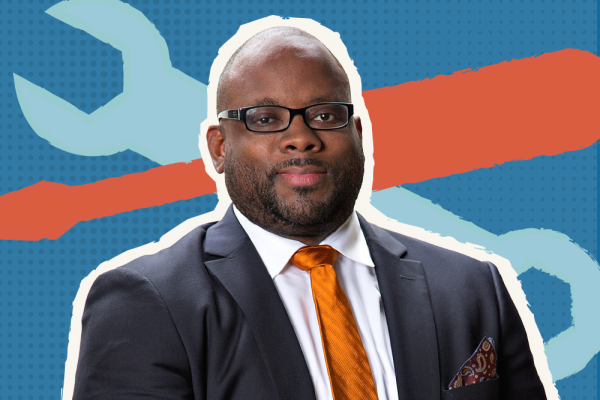This interview is part of The Reconstruct, a weekly newsletter from Sojourners. In a world where so much needs to change, Mitchell Atencio and Josiah R. Daniels interview people who have faith in a new future and are working toward repair. Subscribe here.
I am not convinced that the way progressive Christians have criticized Christian nationalism is always particularly insightful or self-aware. For that matter, I am not always convinced that the way journalists even cover Christian nationalism is particularly insightful or self-aware.
I don’t think the antidote to preventing the spread of Christian nationalism is as simple as pointing out all the ways that it is bad. Progressive Christians simply dismissing Christian nationalists as “fake Christians” fail to properly consider the dominant, exploitative versions of Christianity. I do not think such a dismissal provides an avenue for people to engage in conversations that might lead people away from religious extremism.
And yet, Christian supremacy and Christian extremism must be talked about, investigated, and critiqued. Whether in the past or in the present moment, it is demonstrably true that the politics of the United States have been shaped by Christians who use religion as a vehicle for control.
Mitchell Atencio, who is the senior associate news editor for sojo.net and the co-founder of The Reconstruct, noted in February that according to the Pew Research Center only 6% of Americans fit Pew’s definition of what might be considered Christian nationalist. Furthermore, a case can be made that Christian nationalist beliefs are growing less prevalent. But as sociologist Musa al-Gharbi told me in March, Christian nationalist beliefs are flourishing in an unexpected place: among non-white Americans.
Christian nationalist ideology expanding to non-white and non-Christian populations is a particular area of interest for Eric L. McDaniel, who is a professor in the department of government at the University of Texas at Austin. In The Everyday Crusade: Christian Nationalism in American Politics, McDaniel and his co-authors, Irfan Nooruddin and Allyson F. Shortle, explore how religious nationalist ideology is gaining influence with the American public.
In my interview with McDaniel, we discuss the definition of Christian nationalism and its shortcomings, American (religious) exceptionalism, whiteness, and what progressives miss when critiquing religion and religious extremism.
This interview has been edited for length and clarity.
Josiah R. Daniels, Sojourners: One of the things that you said during Poynter’s Beat Academy training on covering Christian nationalism was that you think it's better to talk about “American religious exceptionalism” rather than Christian nationalism.
How do you define Christian nationalism? How do you define American religious exceptionalism?
Eric L. McDaniel: Christian nationalism is about the idea of creating a Christian state in which a particular Christian ideology dominates all of American politics. And when we talk about Christian nationalism, we’re talking about the rise of MAGA and a particular strain of white Christian nationalism, which supports a version of Christianity that puts white men — specifically white heterosexual, wealthy men — at the top of a hierarchy. Anything that challenges that is seen as unholy or heretical.
American religious exceptionalism: We call it that because if you look at how we measure it and how we think about it, it’s this idea that your nation was divinely inspired. It is at the top of a divine hierarchy, and it has a divine mission. And we think that this is not just something that is important to America, but other nations have this as well.
Also, [using this terminology] opens it up to other religious groups. American religious exceptionalism can be carried out in other places as well.
Christian nationalism is more overt, and people are scared away from that. But the American religious exceptionalism, that’s something that is baked into the cake. “One nation under God,” “the image of God,” “God bless America” — these are constant images that we have of the divine favoring us. With American religious exceptionalism, the U.S. doesn’t need to work with other nations because whatever the U.S. does is divinely ordained. Much like Christian nationalism, any mistakes the U.S. has made were made out of innocence in an attempt to achieve God’s will. This is where you see people making the argument, “Yes, slavery was wrong, but it made Blacks Christians.” There’s also, “Yes, slavery was wrong, but it was part of God’s plan, and so therefore people should not be criticized for what they’ve done.”
Do you think that there’s something in Christianity that allows for nationalistic impulses to flourish?
I think it’s something in the Christian interpretations that people use to seek power.
The critical thing here is this: Are you a Christian to carry out the work of Christ, or are you a Christian to gain power? One of the things we do know about conversion is that people converted to Christianity for trade or to gain power.
But if you are a Christian to feed the poor, clothe the naked, heal the sick, you’re not concerned about your individual power, you are concerned about the others. A lot of people talk about the Christianity of Christ versus the Christianity of Constantine. When Christianity became part of the mainstream, it became about maintaining power. The thing about the Christianity of maintaining power is that it is much less work than the Christianity of helping the poor. Because the Christianity of maintaining power is just about I pray I don’t have sex with certain people and that’s really about it. But the Christianity of Christ is about constantly helping others. That is something that we have to come to grips with.
What are some of the varieties of American religious exceptionalism or Christian nationalism? What are progressive Christians missing when they critique these ideologies?
One of the problems progressives have had is dealing with religion — they gave up on religion quickly — and it’s somewhat confusing to see how this came about.
The progressives have been losing ground with religion because they treat religion as irrational, to the point where progressives have complained that when celebrating Martin Luther King Jr. they feel uncomfortable with all the religious talk. The man was a minister. What they’ve done is push religion away as opposed to putting it up front. Clinton used a lot of religious rhetoric. Obama used a lot of religious rhetoric. But for some strange reason, it seems to fall on deaf ears.
But it seems like when people talk about what Christianity is and who the Christians are, it is this one particular group. They’ve been able to dominate what it means to be a Christian. I think the contrary voice has been ignored for a very long time. What we’re seeing now, specifically with the decay of Black religious institutions and religious institutions in general, there are more opportunities for these groups to come in and get people of color to buy into this. Because one of the things they’re doing now is they’re trying to actively convince people of color that thinking about race means you worship race, not God.
Black people being upset about what happened to George Floyd is now being seen as heretical. “God will fix that. Don’t worry about it.”
We call it white Christian nationalism, but there are other versions of Christian nationalism. King had his own vision of what a Christian nation should look like. And it’s nothing like what we’re seeing now. But there’s an argument about Christian identity, an argument that Christianity is under attack.
One of the problems that we’re seeing amongst progressives is their exclusionary behavior. This is why they keep losing people. Especially when it comes to white progressives dealing with people of color, they’re really good at talking at but not talking with. They do not want to have the bar stool, barbershop, or barbecue conversations.
One of the best examples I can think of is this: Prop 8 in California banned same-sex marriage. Now again, there’s a 2008 election. You see the election of Obama. Huge Black turnout and Prop 8 passes banning same-sex marriage in California. And immediately, [progressive] groups went out and started attacking Black people. So it was the Black people’s fault. I remember asking somebody, Did you ever go talk to Black people? No? Maybe you should have.
What’s been shown is you can no longer say, “You are wrong! You're wrong!” We have to actually talk to individuals.
What might it mean for the future of U.S. democracy that American religious exceptionalism and Christian nationalism are taking hold among non-Christians, non-white populations?
For a long time, being a Christian has not meant that you are a follower of God or Jesus’ teachings, but more of an indication of whiteness.
I think that one of the things that’s also important to note is that while surveys show that people of color score high on measures of Christian nationalism, it does not lead to the same attitudes because they may have a different idea of what it means to be a Christian nation.
Once you bring race in, all of a sudden, things change. When Black people talk about certain things, such as being conservative or being religious, it means something different. Blacks and whites are using similar language, but it means something different.
The best way to think about this is by looking at the word “freedom.” If we think of the Freedom Caucus now in Congress, they are very different from the Freedom Riders of the 1960s. And freedom for people of color is different from it is for white people. White people: “Hey, I don’t wanna be told what to do. Leave me alone. Let me do whatever I wanna do, even if it means that I undermine the freedom of some other groups.” Whereas for Black people it’s, “No, give me the freedom to be who I want to be, to become who I wanna become.”
How do you define something like whiteness? I think that it’s become a popular and amorphous term. I think it’s worth being explicit in how we understand and deploy the term.
Whiteness is a category that’s at the top of a socially constructed hierarchy. Part of being white is your heritage, having nobody Black in your heritage, maybe going back to your great-grandparents. But furthermore, you do not question the racial hierarchy. You do not question the gender hierarchy. You do not question the economic hierarchy.
Whiteness is a way to access this club of power. Essentially, whiteness is about power, and it’s a socially constructed way of establishing power that people will position themselves to get as close to whiteness as possible.
But whiteness is a currency, and it’s a way to gain access to things that you would not normally be able to access, and it’s a way of demonstrating to people in power that you will not disrupt their power.
But it’s a very important identity because in this world, where we’re unsure of things, where we don’t feel like we have much control over things, whiteness provides people a little bit of comfort. People are willing to sacrifice a lot of their own freedom in order to achieve whiteness because it is something that we believe is so important and critical to having control over our lives.
Blackness is seen automatically as a threat to whiteness. And so if Black people gain power, that means white people gain [more] power. And if you look at any moment in history where you’ve seen an advancement for racial equality, it has always met with a huge blowback.
So during the Reconstruction, you are met with the Klan and Jim Crow. After the Civil Rights Movement, you’re met with the Reagan era and all of its attempts to push back. The nation is still wrestling with who is really American.
Got something to say about what you're reading? We value your feedback!






